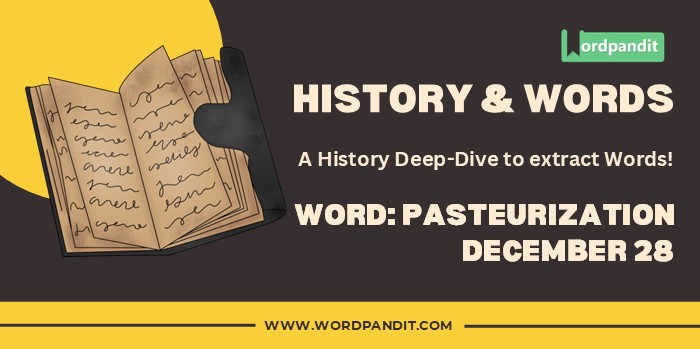History & Words: ‘Pasteurization’ (December 28)
Welcome to ‘History & Words.’ 🌟 I’m Prashant, founder of Wordpandit and the Learning Inc. Network. This series combines my passion for language learning with historical context. Each entry explores a word’s significance on a specific date, enhancing vocabulary while deepening understanding of history. Join me in this journey of words through time.
📚 Table of Contents
- Word of the Day
- Introduction
- Etymology
- Key Vocabulary
- Historical Context
- Timeline
- The Day’s Significance
- Quote
- Modern Usage and Reflection
- Legacy
- Comparative Analysis
- Did You Know?
- Conclusion
- Further Reading
🔍 Word of the Day: Pasteurization
Pronunciation: /ˌpɑːstʃəraɪˈzeɪʃən/ (pas-chur-eye-ZAY-shun)
🌍 Introduction
On December 28, 1895, Louis Pasteur, one of science’s most influential figures, passed away, leaving a legacy that continues to impact public health and food safety worldwide. His development of pasteurization revolutionized food preservation and helped establish the field of microbiology.
The word “pasteurization” represents more than just a food preservation technique – it marks a fundamental shift in our understanding of microorganisms and their role in disease and food spoilage. This process has saved countless lives by preventing foodborne illnesses.
Pasteur’s work extended far beyond this eponymous process, encompassing groundbreaking research in vaccination, fermentation, and the germ theory of disease, making him a pivotal figure in the history of modern medicine and public health.
🌱 Etymology
The term “pasteurization” is derived from Louis Pasteur’s surname, with the process being named in his honor in the 1880s. The addition of “-ization” denotes the process or treatment, creating a word that would become synonymous with food safety worldwide.
📖 Key Vocabulary
- 🔑 Microbiology: The study of microorganisms, including bacteria, viruses, and fungi.
- 🔑 Fermentation: The metabolic process that produces chemical changes in organic substrates.
- 🔑 Pathogen: A microorganism that can cause disease.
- 🔑 Thermal Processing: The use of heat to preserve food and eliminate harmful bacteria.
🏛️ Historical Context
Before pasteurization, food and beverage preservation was unreliable, leading to frequent illness and spoilage. Ancient civilizations used techniques like salting and fermentation, but understanding of why these methods worked was limited.
Pasteur’s work began with studying fermentation in wine and beer, leading to his discovery that microorganisms were responsible for spoilage. This research laid the foundation for both pasteurization and the germ theory of disease.
⏳ Timeline
- 1822: Louis Pasteur born.
- 1857: Pasteur proves fermentation requires living organisms.
- 1862: First pasteurization experiments with wine.
- 1864: Pasteurization process patented.
- 1867: First commercial pasteurization of milk.
- 1886: First mandatory pasteurization laws.
- 1895: Pasteur’s death (December 28).
- 1908: Chicago becomes first U.S. city to require milk pasteurization.
🌟 The Day’s Significance
December 28, 1895, marked the end of Pasteur’s remarkable life but also prompted global recognition of his contributions to science and public health. His death led to increased adoption of pasteurization worldwide.
The scientific community’s response to his passing highlighted the revolutionary nature of his discoveries and their practical applications in preventing disease and preserving food.
Pasteur’s legacy continued through the Pasteur Institute, which he founded in 1887, and continues today as a leading research institution.
💬 Quote
“In the fields of observation, chance favors only the prepared mind.” – Louis Pasteur
🔮 Modern Usage and Reflection
Today, pasteurization remains a cornerstone of food safety, with new technologies like ultra-high temperature (UHT) processing building on Pasteur’s principles.
The process has evolved to include methods like flash pasteurization and high-pressure processing, demonstrating the continued relevance of Pasteur’s work in modern food science.
🏛️ Legacy
Pasteur’s work fundamentally changed our approach to food safety, disease prevention, and public health. Pasteurization has saved millions of lives by preventing foodborne illnesses.
The Pasteur Institute continues his work, conducting crucial research in infectious diseases and vaccine development.
🔍 Comparative Analysis
While early pasteurization focused solely on food preservation, modern applications extend to pharmaceutical products, cosmetics, and other industries, showing how a single scientific discovery can evolve to serve multiple purposes.
💡 Did You Know?
🎓 Conclusion
Pasteurization represents one of science’s most practical and life-saving discoveries, demonstrating how careful observation and experimentation can lead to innovations that benefit humanity for generations.
📚 Further Reading
- 📘 “Louis Pasteur: The Life and Legacy of a Scientific Pioneer” by Patrice Debré
- 📗 “The Pasteurization of France” by Bruno Latour
- 📙 “Milk: A 10,000-Year Food Fracas” by Mark Kurlansky














